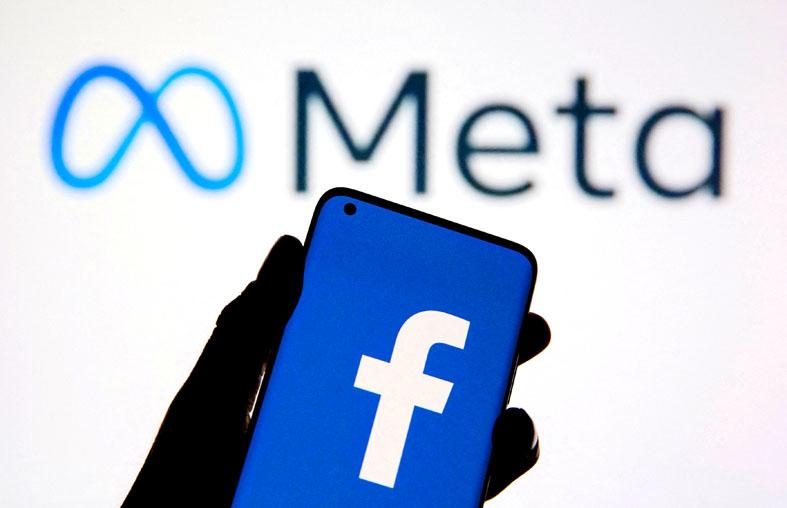Meta Platforms Inc on Friday said that it is adding the ability to socialize in virtual reality with an update to its Quest 2 headsets in another step toward the metaverse.
The tweak heading for the latest model Quest from Meta-owned Oculus lets wearers hop into virtual settings with friends, Meta CEO Mark Zuckerberg said in a video post on Facebook.
“I’m here to announce the ability to, as soon as you put on your Quest 2 headset, to have people hang out with you in a social environment,” Zuckerberg said.

Photo: Reuters
The update opens a door to the Horizon World virtual reality platform that Facebook parent Meta opened to the public in North America at the end of last year.
Meta is also working on letting people create their own virtual worlds to host gatherings of avatars, Zuckerberg said.
Horizon Worlds is far from a fully realized metaverse, a future Internet where online experiences like chatting with a friend would eventually feel face-to-face thanks to virtual reality headsets.
However, the platform does let people gather online with friends or others, play games and immerse themselves in 360-degree videos.
Meta earlier this year instituted a minimum distance between users’ avatars in its virtual reality Horizon network after reports of harassment, one of the thorny issues for its metaverse vision.
The “personal boundary” function in the immersive platform puts a ring of space around users’ digital proxies.
Facebook renamed its parent company to Meta in October last year to emphasize its shift from a scandal-prone social media platform to a future in virtual reality.
The firm’s metaverse push also includes tools for remote working, which boomed during the COVID-19 pandemic.
Meta and a French digital training firm plan to launch a “metaverse academy” in France for the new academic year, the two companies said yesterday.
The school’s goal in its first year is to provide free training to about 100 students in two specialties: immersive technology developers, and support and assistance technicians, Meta vice president for southern Europe Laurent Solly said.
Lessons are to be in-person and involve projects, with a focus on the 3D world and interactions in the virtual universes, said Frederic Bardeau, head of Simplon, the French firm working with Meta.
Located in the capital, Paris, and other cities including Lyon, Marseille and Nice, the metaverse academy is to train 20 students per city each year.
Particular attention is to be paid to diversity. Solly said the target was for 30 percent of the first cohort to be women, while Bardeau said he would not look at applicants’ CVs and endorse positive discrimination.
In October, Meta said it intended to create 10,000 jobs in Europe in five years’ time to build the metaverse. The goal is tied to predictions that future job skills demanded by employers will be closely tied with the metaverse.
Meta and Simplon said 80 percent of the careers that will exist in 2030 have not been invented yet, highlighting the need to develop training schemes now.

BYPASSING CHINA TARIFFS: In the first five months of this year, Foxconn sent US$4.4bn of iPhones to the US from India, compared with US$3.7bn in the whole of last year Nearly all the iPhones exported by Foxconn Technology Group (富士康科技集團) from India went to the US between March and last month, customs data showed, far above last year’s average of 50 percent and a clear sign of Apple Inc’s efforts to bypass high US tariffs imposed on China. The numbers, being reported by Reuters for the first time, show that Apple has realigned its India exports to almost exclusively serve the US market, when previously the devices were more widely distributed to nations including the Netherlands and the Czech Republic. During March to last month, Foxconn, known as Hon Hai Precision Industry

Taiwan Semiconductor Manufacturing Co (TSMC, 台積電) and the University of Tokyo (UTokyo) yesterday announced the launch of the TSMC-UTokyo Lab to promote advanced semiconductor research, education and talent development. The lab is TSMC’s first laboratory collaboration with a university outside Taiwan, the company said in a statement. The lab would leverage “the extensive knowledge, experience, and creativity” of both institutions, the company said. It is located in the Asano Section of UTokyo’s Hongo, Tokyo, campus and would be managed by UTokyo faculty, guided by directors from UTokyo and TSMC, the company said. TSMC began working with UTokyo in 2019, resulting in 21 research projects,

Taiwan’s property market is entering a freeze, with mortgage activity across the nation’s six largest cities plummeting in the first quarter, H&B Realty Co (住商不動產) said yesterday, citing mounting pressure on housing demand amid tighter lending rules and regulatory curbs. Mortgage applications in Taipei, New Taipei City, Taoyuan, Taichung, Tainan and Kaohsiung totaled 28,078 from January to March, a sharp 36.3 percent decline from 44,082 in the same period last year, the nation’s largest real-estate brokerage by franchise said, citing data from the Joint Credit Information Center (JCIC, 聯徵中心). “The simultaneous decline across all six cities reflects just how drastically the market

Ashton Hall’s morning routine involves dunking his head in iced Saratoga Spring Water. For the company that sells the bottled water — Hall’s brand of choice for drinking, brushing his teeth and submerging himself — that is fantastic news. “We’re so thankful to this incredible fitness influencer called Ashton Hall,” Saratoga owner Primo Brands Corp’s CEO Robbert Rietbroek said on an earnings call after Hall’s morning routine video went viral. “He really helped put our brand on the map.” Primo Brands, which was not affiliated with Hall when he made his video, is among the increasing number of companies benefiting from influencer